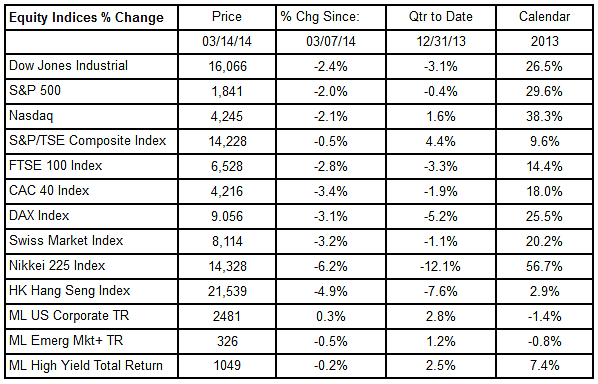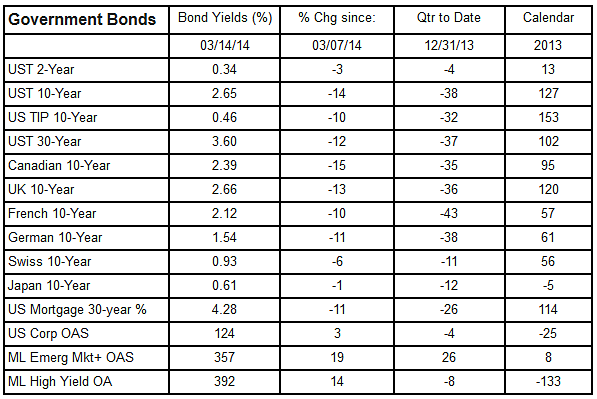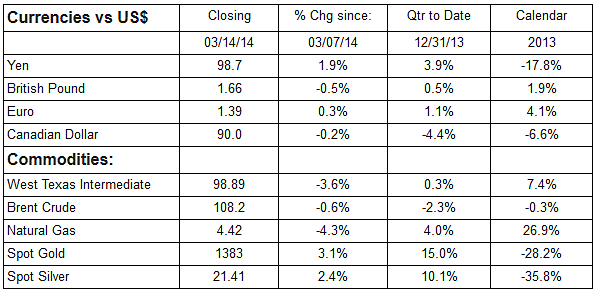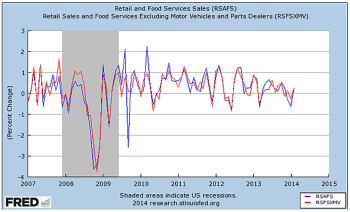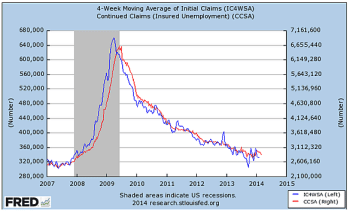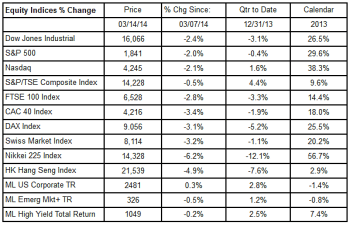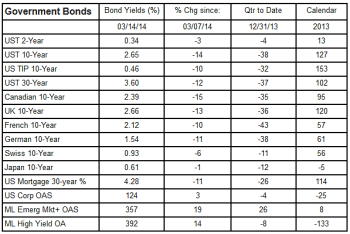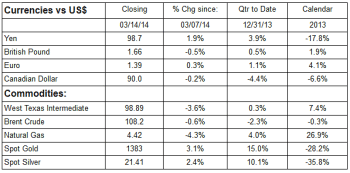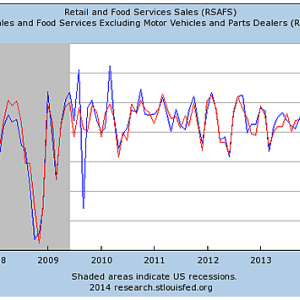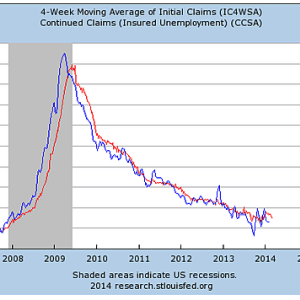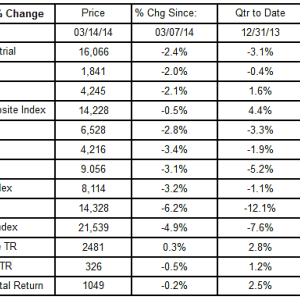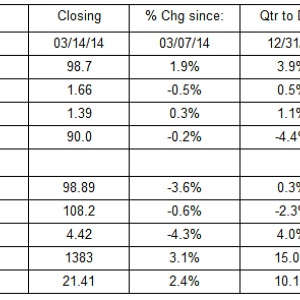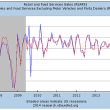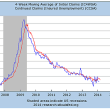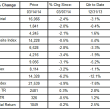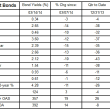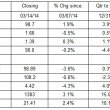John Davidson's Economic Comments: Week ending March 14
Most Economic releases showed no pick-up of activity again this week. The U.S. Initial Jobless Claims was an exception, since it showed the firming of the U.S. employment situation. Nonetheless, the markets were more focused on softening of China's growth, the double digit year-to-date decline of the Nikkei and concerns about what might result from Russia's military incursion into the Ukraine. In a flight to safety, equity markets declined, credit spreads widened and government bond markets rallied. The U.S. dollar was mixed, but energy prices fell and metals prices gained on the week.
Perspective:
This winter has been severe by all accounts. My investment banker friend in Florida tried to make me feel better by claiming 5 inches of snow in his yard, but I had a hard time verifying that from any other source. Sara Potter of Fact Set wrote an article Will Winter Weather Cause an Economic Chill?, which included more reliable data. She highlighted U.S. National Oceanic and Atmospheric Administration data on aggregate heating days for the East North Central Region (Illinois, Indiana, Michigan, Ohio and Wisconsin), which was running higher than "anything seen in the past 15 years." Fuel oil consumption was "up 17.8% in December and 14.5% in January compared to the prior year..." She added, "The more tangible impact of bad weather is the loss of worker productivity due to flight cancellations, impassable roads and school closure." Whether or not the economic impact of this severe winter has done permanent damage to the economy or the lost economic activity is made up in future spending will unfold in the coming months of economic releases.
On a personal note, the Davidson family's economic and travel activity is guaranteed to pick up later in 2014. This weekend my wife is attending a baby shower for Ella, our first granddaughter, due next month. Our second grandchild is due in September. It is still cold outside in Maine, but our hearts could not be warmer!
Economic Releases:
The U.S. Retail Sales numbers for February were near the high end of the range of expectations, but January's Sales were revised lower, showing the continued impact of weather. Headline Retail Sales (blue in the chart) rose +0.3% in February, but January's Sales were revised two ticks lower to -0.6%. Without the more volatile automobile and Food sectors, Sales (red in the chart) also rose +0.3%, but January Sales, less food and auto's, were revised six ticks lower to -0.6%.
The Initial Claims for Unemployment in the U.S. were more solidly positive. New Claims fell -9,000 to 315,000 the week of March 8. The four-week average of Claims (blue in the chart) fell to 330,500. Continuing Claims, reported on a 1-week lag, (red in the chart) also fell 48,000 to 2.855 million. This improving employment picture should allow the Yellen Fed to continue to taper its QE purchases.
Other Economic Releases
The University of Michigan Consumer Sentiment Index slipped over a point to 79.9 in mid-March. The release of the Producer Price Index for February showed no signs of inflationary pressure. PPI fell -0.1% from the previous month and rose only +0.9% year-over-year. Less the more volatile food and energy component, PPI fell -0.2% from the previous month and rose 1.1% from the previous year.
This week's releases showed that growth is slowing in China, more than expected. Industrial Production rose less than previously estimated in January and February. The increase of +0.61% led to an 8.6% year-over-year change, almost a full percentage point less than expected. Similarly, China's Retail Sales rose +0.71% in February, an 11.8% annual increase, almost 2 percentage points less than expected.
The Bank of Japan met and left its interest rates and asset purchases unchanged in the face of lackluster economic performance.
Industrial Production in the European Union fell -0.2% in January, well below consensus. IP in the UK was a bit better, +0.1%.
Equities Markets:
Growth worries in China and the potential for economic repercussions from the geopolitical risks in the Ukraine weighed heavily on stocks across the globe. The "risk-off" reaction was a decline in stock prices and the widening of credit spreads. This week's decline pulled most stocks into negative territory for the quarter-to-date. Spread widening pulled the riskier credit indices into negative territory for the week despite the decline in government rates. Nonetheless, the ML credit market indices below were able to maintain positive year-to-date results.
Bond Markets:
In a flight to safety, government bond yields dropped across the globe this week in reaction to the geopolitical risks. Credit spreads widened, especially in the riskier credit sectors. Year to date, Government Bond yields are lower and non-emerging market credit spread are narrower.
Currencies & Commodities:
The U.S. dollar rose against the Pound and Looney, but fell against the Yen and Euro. The year-to-date 3.9% rise of the Yen was not sufficient to offset the -12.1% decline of the Nikkei for U.S. investors in the Japanese stock market. Energy prices fell and commodity metals prices rose on the week.
John W. Davidson, CFA, started writing these Comments more than a decade ago as a personal discipline when he was promoted to from portfolio manager to chief investment officer and CEO.

Most recently, he was the president of PartnerRe Asset Management Corporation, responsible for the management of PartnerRe's invested assets, which grew from $4 billion to $12 billion during his tenure. After joining PartnerRe in the fall of 2001, he hired the staff, built the trading floor and created the infrastructure to manage both fixed income and equity assets internally. He retired from PartnerRe at the end of 2008 and moved to Maine, where he focused on board work.
He has more than 35 years of industry experience, including positions with investment management responsibility for separate institutional accounts, mutual funds, trusts and insurance assets. Prior to joining PartnerRe, he served as president and chief executive officer of two other investment management companies. For various companies he has held positions as chief investment officer, chief economist, head of fixed income and portfolio manager. As a portfolio manager, Davidson managed and traded U.S. Government Securities as well as futures and options on fixed income instruments.
His real world experience is backed by a strong academic foundation, which includes earning a Master of Business Administration in finance and a Master of Arts in mathematics from Boston College, as well as a Bachelor of Arts, cum laude, in economics from Amherst College. He holds the professional designation of chartered financial analyst.
His experiences and credentials have brought him to the public as a television commentator and conference speaker. In addition to his frequent past appearances on CNBC, CNNfn, Bloomberg TV and Yahoo FinanceVision, he appeared as a special guest on Wall $treet Week with Louis Rukeyser. Reuters, Bloomberg and other business press services have quoted his views on the market. He has taught CFA preparation programs, as well as other courses offered by the Stamford and Boston CFA Societies, and the National Graduate Trust Officers' School.
Davidson is a natural leader in both his professional and personal life, having developed those skills early in his career as a naval officer. He spent three years on active duty, which included a year on the rivers of Vietnam, and 24 years in the Naval Reserve, from which he retired as a captain in 1994.
Davidson is treasurer and board member of the Camden Conference. He is also on the investment committee of the Pen Bay Health Foundation. He serves as an independent trustee for mutual funds.
In his leisure time, he is an active sailor, tennis player and skier. With his wife, Barbara, he renovated a 100+-year-old home in Camden, where they enjoy spending time with their two golden retrievers and having visits from their five children. He can be reached at jwdbond@me.com.
Event Date
Address
United States



